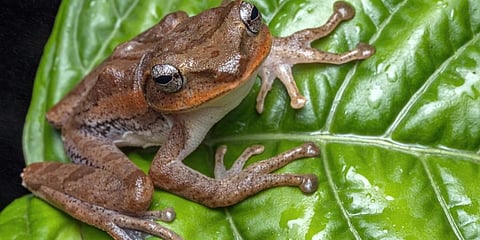

GUWAHATI: The elusive dancing frogs of the Western Ghats are one of the most threatened amphibian species-genus, a global study found.
Sixty-four species of amphibians, found in the Western Ghats, are on the list of endangered species. Overall, the world is facing a critical amphibian crisis with 41% of the species on the brink of extinction, the Wildlife Trust of India (WTI) said in a statement based on the findings.
The second Global Amphibian Assessment, a comprehensive analysis of 8,011 species worldwide conducted by over 1,000 experts, revealed the alarming statistics.
Led by Re:wild, Synchronicity Earth, and the IUCN SSC Amphibian Specialist Group, the study indicated that climate change, alongside habitat loss, disease, fire, invasive species and over-exploitation, is one of the biggest and most direct threats to amphibians.
Dr Gururaja K V, a Batrachologist who contributed to the study, said the “Micrixalus” genus, commonly known as dancing frogs and endemic to the Western Ghats, has a curious habit of waving their hind legs to defend their territory from intruding males during the breeding season.
“Among 24 species of dancing frogs assessed as part of the Second Global Amphibian assessment, two are critically endangered and 15 are endangered making them the most threatened of all Indo-Malayan genera,” Gururaja said.
Vivek Menon, Chair of the Global Council of Amphibian Survival Alliance & Founder and ED, WTI expressed concern that amphibians are the second most declining taxa in the world after corals.
“Munnar in the Western Ghats is identified as a Key Biodiversity Area and an Alliance for Zero Extinction site due to its critical role in preserving threatened amphibians. WTI in partnership with Synchronicity Earth has been working to assess amphibian populations, building stakeholder consensus and focussing on habitat restoration,” Menon, who also leads WTI’s Amphibian Recovery Project, added.
Western Ghats, a biodiversity hotspot spread across Kerala, Karnataka and Tamil Nadu, is rich in amphibian diversity. Kerala has 178 species of which 84 are threatened, Tamil Nadu is next with 128 species of which 54 are threatened and Karnataka is in third place with 100 species of which 30 are threatened.